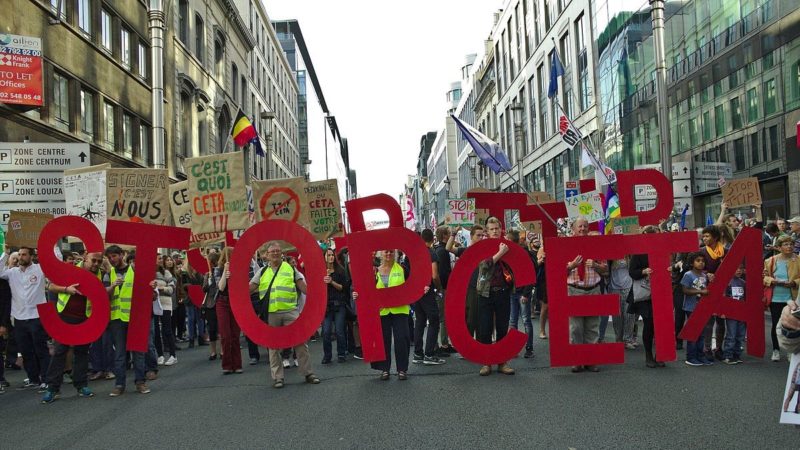Labour appear to have struck the 'worst of all worlds' position when it comes to CETA - angering free trade proponents and social justice campaigners alike.

Campaigners have reacted with disappointment and anger after MPs overwhelmingly voted to ‘rubber stamp’ a key EU treaty with Canada today.
Civil society groups had warned that the ‘toxic’ Comprehensive Economic and Trade Agreement (CETA) threatens democracy and public services, and called on MPs to reject the plans.
But the proposals – on which Parliament had a non-binding say – sailed through by 315 votes to 36, after Labour ordered MPs to abstain on the vote.
A coalition of campaign groups – which includes Friends of the Earth and War on Want – warned that a system of secret ‘corporate courts’ will give big business the power to sue states for policies which affect their profits, including renationalisation.
Despite Brexit, many of the provisions of CETA will apply to the UK for another 20 years after we leave, while Liam Fox told Parliament today it would form the basis for a future UK-Canada deal.
But trade justice groups say that like TTIP – the failed US-EU treaty – CETA would weaken social, health and environmental standards – and make it impossible to re-nationalise privatised services like utilities and railways.
MPs do not usually vote on trade deals – but the government has taken the unusual step of giving MPs a vote in a process that is usually a formality, arguably in a bid to show up Labour divisions on the issue.
Labour’s frontbench told MPs to abstain on the deal, offering mixed messages on whether they back a treaty or not.
Speaking to Left Foot Forward, War on Want’s Senior Campaigner on trade Jean Blaylock said she was ‘disappointed’ in Labour’s decision not to reject the deal:
“This was a real opportunity to speak up for better way of doing trade policy. So many MPs didn’t take that opportunity.
“Until recently [Labour] had a very clear position, especially around ISDS [investor-state dispute settlement or ‘corporate courts’], opposing it in their manifesto.
“Just last week Jeremy Corbyn was speaking proudly about that position, a position they’ve always taken a lead on. Yet instead of standing up for that they literally sat down.”
She said ‘we need a better, fairer and more progressive way of doing trade – not more of the same’.
Blaylock added the current trade deal approach is ‘all about deregulation’. The focus refers to ‘barriers’ – “what they mean is environmental, labour and safety standards. Policies we’ve chosen to put in place.”
The campaigners are urging a shift to a green approach to free trade: “That would include lowering renewable tariffs on renewables, and raising them based on carbon footprints/fossil fuels. The current approach means you can’t make those judgements.”
A no vote from MPs would not have stopped the deal however – a sign of things to come post-Brexit.
“The government just wanted to expose Labour fractures today. We need Parliament to have a say in trade deals. They affect so many areas of life. They’re not just about tariffs – they impact food safety, climate policy and much more,” Blaylock told this site.
Ahead of the vote in the Commons, Liam Fox said rejecting the deal would unleash a ‘torrent of instability’, arguing we’ll miss out on ‘hundreds of millions of pounds year’ without it (there was little comment about the instability Brexit itself would bring).
When pressed on how to improve the deal post-Brexit, Liam Fox argued CETA ‘could have been better for services.’ The last comment struck an amusing irony: this week has seen hints that the government’s planned EU deal will not include free trade in services.
That’s despite services making up 92 per cent of Manchester and London’s economy, 91 per cent in Edinburgh, 83 per cent in Leeds and 82 per cent in Birmingham, as the Standard reports.
Fox also said he’d like a new UK-Canada deal to include agreements on increasing data sharing – a surprising comment given the passing of new GDPR regulations and data scandals involving tech giants in recent months.
But the Lib Dems’ Tom Brake noted that the ISDS mechanism – the proposal for courts to rule on trade disputes under the deal – would represent a threat to UK sovereignty.
War on Want’s Jean Blaylock sounded a warning note after today’s vote:
“We’re going to have less democratic control over treaties after we leave the EU: rather than going to Parliament, powers are being concentrated in Ministers’ hands.”
Josiah Mortimer is Editor of Left Foot Forward. Follow him on Twitter.
To reach hundreds of thousands of new readers we need to grow our donor base substantially.
That's why in 2024, we are seeking to generate 150 additional regular donors to support Left Foot Forward's work.
We still need another 117 people to donate to hit the target. You can help. Donate today.



